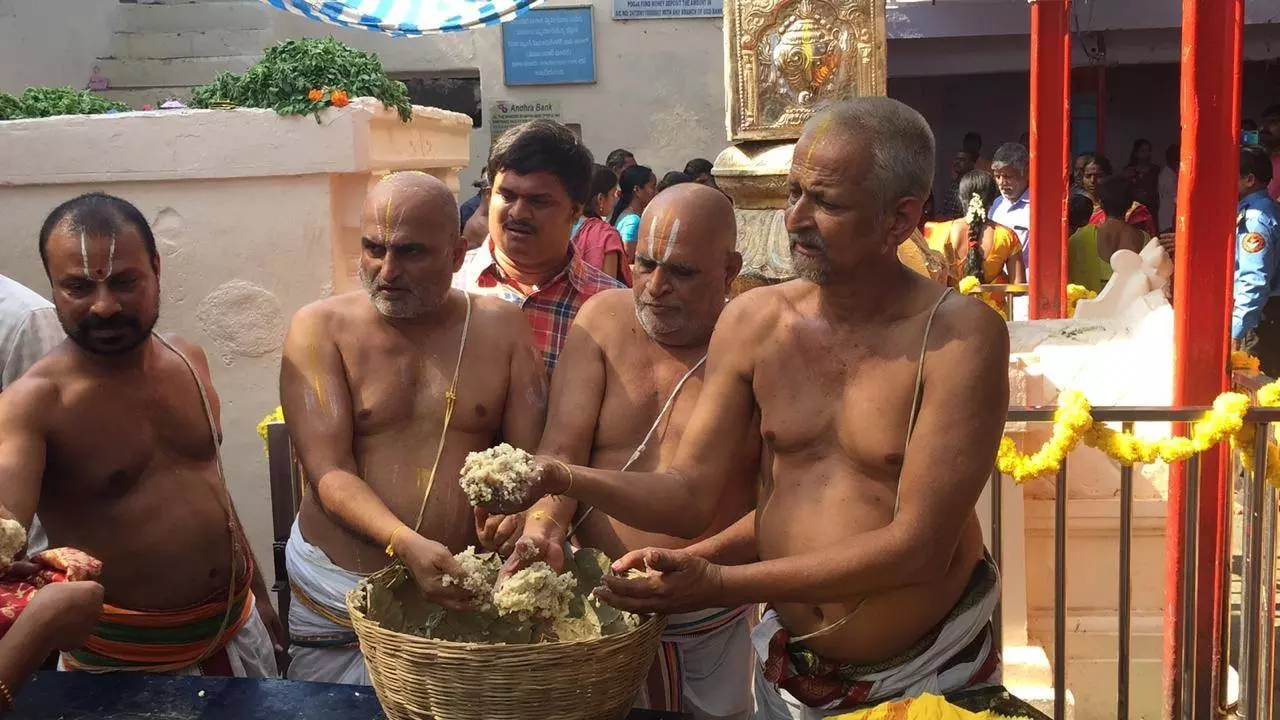
Amid rising infertility in Telangana, crowds seek divine intervention
Long work hours, changing lifestyles trigger widespread infertility; amid high cost of treatment and zero insurance support, couples see divine intervention

On April 19, thousands of families desperate for children queued up to receive the Garuda prasadam at the Chilkur Balaji temple near Hyderabad. It looks like the presiding deity, Lord Venkateswara, is acquiring a new dimension: Santana Balaji. The 12-km long queue of people was a testimony to this.
By afternoon, the surging crowds grew uncontrollable, leading to a major traffic problem.
Police had to send home many saying the distribution of the prasadam had been stopped. It took nearly three hours to clear the traffic.
What is Garuda prasadam?
On the first day of Brahmotsavam, or Chaitra Masa Shukla Paksha Ekadashi, a flag with a portrait of Garuda is hoisted over the temple in a symbolic invitation to the deities to attend the festival. During the flag hoisting, a sacred food (naivedyam) is offered to Garuda.
After the offering, the food, consisting of sweetened rice, is distributed to childless women as Garuda prasadam. A belief that the prasadam bestows the Lord’s blessings to conceive children is gaining popularity in Telangana.
Temple priest Rangarajan told The Federal that the number of devotees is unusually high this year though the Garuda prasadam has been distributed for about 50 years.
Is it an indication of the growing problem of infertility among couples in Telangana? Yes, indeed, many researchers and experts say.
High infertility
A 2023 study by the Institute of Public Health, Hyderabad, found Telangana to be one of the top four states with high rates of infertility.
According to the study, based on data from the National Family Health Survey-5 (NFHS-5 2019-21), the infertility burden among the women in the state is 25.7 (out of 1,000). The toppers are Chhattisgarh, Karnataka and Mizoram.
The observation of Dr Shalini Singh, an IVF expert from the city’s Hegde Fertility Centre, almost confirms this: around 15 per cent of the couples in Telangana are afflicted with infertility.
Southern India trends
Another 2023 study by researchers from the Jawaharlal Nehru University, New Delhi, and the International Institute for Population Science, Mumbai, also found a dip in fertility rates in southern states including Telangana.
According to the study, 20 per 1,000 couples in Karnataka, Tamil Nadu, Telangana, Kerala and Andhra are having difficulty conceiving.
On February 9, experts from the Genome Foundation (GF), Hyderabad, raised an alarm that infertility in Hyderabad was growing.
The KPC Gandhi, GF Managing Director; V Sandhya from the Department of Genetics in Osmania University, Krishna Chaitanya of Oasis Infertility Centre, and Vasundhara, a gynaecologist from KIMS Hospitals, said more and more couples were struggling to conceive due to infertility, more so in Hyderabad.
Various factors
The experts also highlighted that for over a decade or so, the problem, which was earlier common among women, had afflicted men as well.
Talking to The Federal, Dr Krishna Chaitanya said Telangana had experienced an exponential rise in infertility among men and women due to urbanisation, globalisation and the related changes in lifestyles.
Given Hyderabad's global dimension, the views by Dr Chaitanya acquire significance. Stating that infertility was no longer an urban issue, he said the problem was now seen both in rural and urban areas.
“Though the infertility is triggered by many factors, the present trend mainly is related to lifestyle factors. The same factors have affected the rural areas as well,” he said. “The reproductive age of a person is 21-40 years. Delayed marriages and ignorance about the causes of infertility have complicated matters. Conceiving after 40 years is difficult. Many people are now aware of it.”
Lifestyle issues
Curiously, Dr Naveen Chandra Acharya of the Ramayya Pramila Urology Hospital, Hyderabad, claims there is a relationship between infertility and the lifestyles of software employees in the city.
In his view, lifestyle changes such as irregular work hours, night shifts and food habits seem to have triggered infertility among techies. “Out of 10 people who visit our hospital for treatment for infertility issues, the majority are software employees from the Hi-Tech City area,” he said.
Dr A Sandhya, Assistant Professor from Department of Genetics, Osmania University, also said the infertility rate was a cause of alarm in the state. The doctor blames three factors — genetic, anatomical and lifestyle — as contributors to the trend.
“The modern lifestyle factors like irregular working hours, disturbing sleep patterns, delayed marriages, food habits, alcoholism and smoking are mainly seen as the trigger for this,” she told The Federal.
Weather to blame?
Dr Sayeed Unisa, Adjunct Professor from the Tata Institute of Social Sciences, Mumbai, sees a connection between infertility and the temperatures of Andhra Pradesh and Telangana.
She told The Federal: “In the case of Telangana and Andhra, the temperature is extremely during summer. It impacts women's and male fertility by reducing ovum and sperm quality.”
Why temples?
Talking about the infertile crowds seeking divine intervention at the Chilkur temple, she said: "When people do not have resources and are not getting solutions, they will go to any extent to solve the problem — by visiting temples, dargahs, churches.
“Diagnostic facilities for infertility are not available in the government sector. Significant expenses are incurred on diagnostic tests, and couples discontinue treatment after spending much money on tests and treatment. Insurance firms do not cover the specialised treatment of infertility. So, couples go to religious places as a last resort.”
But Dr Bharati, a sexologist and counsellor, sees a social malady behind the crowds at the temple.

